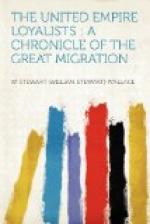The most careful analysis of the Loyalist immigration into the Maritime Provinces has placed the total number of immigrants at about 35,000. These were in settlements scattered broadcast over the face of the map. There was a colony of 3,000 in Cape Breton, which afforded an ideal field for settlement, since before 1783 the governor of Nova Scotia had been precluded from granting lands there. In 1784 Cape Breton was erected into a separate government, with a lieutenant-governor of its own; and settlers flocked into it from Halifax, and even from Canada. Abraham Cuyler, formerly mayor of Albany, led a considerable number down the St Lawrence and through the Gulf to Cape Breton. On the mainland of Nova Scotia there were settlements at Halifax, at Shelburne, at Fort Cumberland, at Annapolis and Digby; at Port Mouton, and at other places. In what is now New Brunswick there was a settlement at Passamaquoddy Bay, and there were other settlements on the St John river extending from the mouth up past what is now the city of Fredericton. In Prince Edward Island, then called the Island of St John, there was a settlement which is variously estimated in size, but which was comparatively unimportant.
The most interesting of these settlements was that at Shelburne, which is situated at the south-west corner of Nova Scotia, on one of the finest harbours of the Atlantic seaboard. The name of the harbour was originally Port Razoir, but this was corrupted by the English settlers into Port Roseway. The place had been settled previous to 1783. In 1775 Colonel Alexander McNutt, a notable figure of the pre-Loyalist days in Nova Scotia, had obtained a grant of 100,000 acres about the harbour, and had induced about a dozen Scottish and Irish families to settle there. This settlement he had dignified with the name of New Jerusalem. In a short time, however, New Jerusalem languished and died, and when the Loyalists arrived in May 1783, the only inhabitants of the place were two or three fishermen and their families. It would have been well if the Loyalists had listened to the testimony of one of these men, who, when he was asked how he came to be there, replied that ’poverty had brought him there, and poverty had kept him there.’




